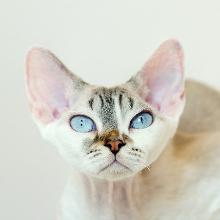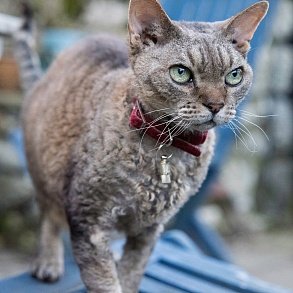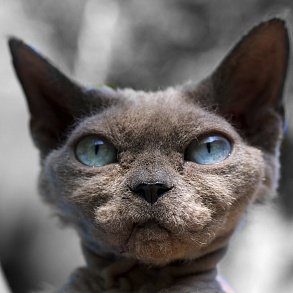Devon Rex

Devon-rex is an eared "Englishman" with soft, wavy fur and huge eyes. It is distinguished by a curious, conflict-free character and almost dog-like devotion to the owner.
Brief information
- Breed Name: Devon Rex
- Country of Origin: UK
- Weight: 2,3-4,5 kg
- Lifetime: 12-17 years old
- Hypoallergenic: Yes
Highlights
- In Russia, the breed began to gain popularity not so long ago, so if you are not deprived of a bit of snobbery and dream of becoming the owner of a relatively rare pet, curly cats will suit you.
- By nature, Devon rexes are quite jumpy, so get ready for the fact that from time to time they will look for adventures on cabinets, mezzanines or even your shoulders.
- Benevolence and livability are the key characteristics of the breed. Any devon will understand that he is not the only pet of the owner.
- Devon-rexes are literally "hot kittens", which is especially noticeable with tactile contact. The illusion of heated skin is created by the short coat of cats, which contributes to a more intense heat transfer. For this reason, animals are sensitive to cold and often freeze even with a slight decrease in air temperature.
- No matter how kindly cats treat children, they will always prefer the company of adults to them. Take into account this character trait and do not burden the animal with communication with the kids.
- Devonian murkas are extremely inquisitive and playful and do not lose these qualities with age. The big-eared "pensioners" love chasing teasers and a ball no less than their young brothers.
Devon Rex is a devoted friend and affectionate nuisance in the body of a big-eyed "alien" from a neighboring Galaxy. To become the owner of such a cute guy means to forget about privacy forever and not get annoyed when you find a purring eared creature next to you, every time you sit down in a chair. And this despite the fact that, by the type of temperament, devons are by no means mattresses, but rather clockwork besyats. Moreover, in each representative of this breed, an indefatigable climber is sensitively dozing, easily conquering any indoor "Everest", starting from the table and ending with the curtain rod.
Breed characteristics
History of the Devon Rex breed
Devon-rexes are the most ordinary mutants, who owe their textured appearance to a bizarre game of genes. The first, resembling an alien alien kotofey was caught in abandoned mines in the vicinity of Devon (England) back in the 60s of the last century. The eared waif who fell into the hands of the British Beryl Cox turned out to be a girl, who after a while brought quite healthy offspring.
As for true fame, of course, it did not shine on Mrs. Cox's mustachioed ward. But one of the babies born by a cat managed to write his name into the history of world felinology. The kitten named Kirli was born slightly curly, which greatly puzzled his own mistress. By that time, the breed was just beginning to come into fashion cornish rex , whose representatives had wavy "fur coats", so the woman came to the conclusion that her pet belongs to this particular cat family. To confirm her own guesses, Mrs. Cox showed Kirley to a well–known breeder at that time - Sterling Webb.
The breeder also did not consider a representative of the new cat clan in the Devonian earwigs, so she tied him with her own cornish rex in the hope that they would give her several high-bred kittens in curls. However, the offspring born as a result did not inherit the wavy "fur coats" of their parents. Moreover, after several unsuccessful mating, it became clear that Kirli is the carrier of a completely unique gene responsible for the curly hair, and he is no relative of Cornish rex. It was this discovery that served as a prerequisite for further breeding experiments. Kirli, who had matured considerably by that time, began to be crossed first with his half-wild mother, and later with his sisters, in order to consolidate the mutation responsible for the structure of the coat. So, figuratively speaking, all modern Devon-Rexes have a common great–grandfather.
Not the least role in the popularization of the breed was played by the reputation of the county itself, in which curly murki were found. Shrouded in a ghostly fog of folk legends and tales, Devon provided his mustachioed natives with a semi-mystical biography. As a result, the nickname "elves" stuck to them, which the animals received because of their extraordinary appearance. At the same time, until the end of the 70s, both Devon and Cornish Rexes were classified as two branches of the same breed and had a common standard of appearance. Only in 1979, under the pressure of the breeders, the PCA gave the elf-like cats the long-awaited "independence" and the right to their own history.
To date, the Devon Rex breed has a very limited gene pool, therefore, in order to "pump" it, felinological associations approve the crossing of curly earwigs with representatives of other feline dynasties. In particular, the CFA considers the relationship between Devon Rex and British or American shorthair acceptable. TICA adds European shorthair cats to this list , siamese and bombay murok.
Video: Devon Rex
Appearance of Devon Rex
Either the notorious Martians, or the characters of English folklore – about such associations are caused by the appearance of these cats in people who first encountered the breed. The average Devon Rex with his huge eyes, "curled" mustache and locator ears looks extremely shocking and could well claim a role in some blockbuster about an alien invasion. Of course, before the infernal image canadian sphinxes Devonian "elves" are a bit far away, but this is the main feature of the breed for everyone who dreams of an elegant big-eared cat, but is not yet ready to settle a completely bald pet in their house.
Head
According to the WCF standard, a real Devon rex should have a small, wedge-shaped head, noticeably stretched in width. The muzzle of the representatives of this feline family is short, with rounded cheeks and a massive chin. The stop is clearly expressed. In general, the contours of the skull of the Devonshire "aliens" are quite prominent, if not sharp.
Ears
The main identifying feature of the breed is huge, extremely deep–set ears with a wide base and a smooth rounded tip. The outer part of the cat's ear tissue is covered with short, thin hair. The presence of brushes and brushes in the auricles is not necessary, but it is quite acceptable.
Eyes
Rather large, the outlines repeating the shape of an oval. They are placed obliquely, at a sufficient distance from each other, which gives the appearance of the Devon Rex a slight aura of mystery. The color of the iris should match the shade of the coat, so most cats have green, yellow or golden-green eyes.
Neck
Not very long, but extremely graceful.
Housing
Paradox: having an elegant, flexible torso with a thin backbone, Devon-rexes are the real heavyweights, able to overcome the bar of 4-4.5 kg. The chest of the "elves" is wide and massive, which is especially pronounced in cats.
Limbs
The legs of Devonshire cats are slender and very long, and the paws are oval and miniature.
Tail
Thin, long, with a well-rounded tip. The hair on the tail is short, but not rare.
Wool
Devon Rexes have practically no covering hair, which makes their fur seem especially soft. In general, the "fur coats" of these earwigs have a very short "pile" with a light wave, which is especially clearly felt if you stroke the pet in the trunk area. On the cat's stomach, neck and chest, the hair is more sparse (not to be confused with possible baldness), but on the back, tail, sides and muzzle, the hair is noticeably thicker. Kittens have shorter hair than adults, and often does not form a characteristic curl.
Color
All types of colors are acceptable for Devon Rex, including acromelanic (thermally dependent) variants.
Defects and defects of the breed
At exhibitions and championships, individuals with stiff fur, disproportionate, elongated head, short tail and small ears do not receive an excellent rating. Devon-rexes with serious external defects, such as:
- pronounced bald spots;
- strabismus;
- polydactyly;
- excessively long, shaggy coat;
- tail hall.
Photo of Devon Rex
Devon Rex character
Devon-rexes, although they depict arrogant majors during photo shoots, remain complaisant and sociable cats at heart. In their fantastic attachment to man, they resemble dogs. Walking behind the owner with his tail, controlling his every step, reminding him of his own presence with persistent purring – all these are typical habits of devons. Among other things, the big-eared "aliens" are very curious and will gladly try to stick their nose where it is possible and where it is impossible. Their anatomical "gadgets" help cats in this matter quite well. Devon-Rex fingers have amazing flexibility, comparable to the dexterity of human hands, so it's a matter of a few seconds to open the door of a kitchen cabinet or drop the lid of a box for an eared tracker.
The notorious feline independence has rested on the devons, so do not be surprised if the pet with enviable constancy not only occupies your knees, but also persistently tries to hang on your shoulders. Similarly, animals try to express their sympathy, which they do not always know how to dose. But with imagination and ingenuity, the Devons are more than fine. If the cat was given to understand that her mimicry is temporarily not needed, she will easily come up with another occupation for herself. For example, he will start playing with the first object that turns up under his paw or "dive" from the closet to the bed until he gets bored. The study of the drawers of the chest of drawers, the contents of the laundry basket or the drum of the washing machine are also quite popular quests among Devons, so it is extremely undesirable to leave the mustachioed "Martian" unattended for a long time. And the point here is not so much in the mess that a bored pet can arrange, as in the fact that representatives of this breed do not know how to cope with loneliness. Deprived of the opportunity to constantly contact the owner, they get nervous, lock themselves in, which really spoils their character.
Devon-rexes are absolutely not jealous cats, gladly accepting any four-legged creature into their company, although some breeders are of the opinion that it is not worth settling two "aliens" in one apartment, since the animals will have to compete for the owner's attention. Another interesting character trait of Devonian Rexes in all respects is their talkativeness. The big-eared prankster will purr, purr in all sorts of ways or invitingly meow in any scenario, so accept this feature as a fact or suppress the desire to have a representative of this breed.
Training and education
Devon-rexes are great smart girls who willingly join in the learning process and grasp new knowledge on the fly, especially if they are presented in an exciting way. Use the animal's predilection for games and teach it to aport toys and other small objects. Believe me, the "elves" are almost as helpful as dogs, and in some tricks they even leave them behind.
As for the violent feline temperament, it must be curbed in a timely manner, so do not be lazy to instill in your pet the norms of etiquette and rules of behavior. Remember: a ban is a ban, exceptions to it are unacceptable. If Devon Rex has discovered a penchant for dancing on the dining table, persistently wean him of this pampering, but do not forget that the kitten needs to splash out energy somewhere. It is not necessary to break the psyche of the animal, forbidding him any jumps. On the contrary, allow your pet to frolic freely, but only in a place where his games will not cause serious damage.
Maintenance and care
If an adult Devon rex is just curious and playful, then his kittens have these qualities hypertrophied to the limit, so if you decide to get a curly ear, accept the need for total surveillance of him at least in the first year of life. The most dangerous places in the house for meticulous devons are the toilet, large containers of water and aquariums in which a tiny creature can easily drown. With indoor plants, too, not all is well. The ubiquitous "aliens" will not miss an opportunity to chew azalea or lick diffenbachia, which in 9 cases out of 10 will provoke severe poisoning in them. Accordingly, make a choice in advance: either flowers or seals.
Don't forget to hide small piercing objects like needles and pins from Devon Rex, which he perceives as toys. Medicines, insecticides, household chemicals should also not be in the public domain, so that the cat does not have a desire to taste them. Be careful with the windows open. Of course, Devon-rexes do not jump into them by their own will, but in pursuit of some insect they can lose their vigilance and get injured.
In order to settle in a new place, the "elf" will need a standard set: a bowl, a scratching post, a tray. If saving on pet comfort is not included in your plans, splurge on buying a full-fledged gaming complex or a maze with pipes. Having acquired ownership of such a "residence", Devon-Rex will less often besiege furniture modules, which will somewhat reduce the destructiveness of his stay in your apartment.
Hygiene
Good news: specific hair care for Devon Rex, except for standard brushing, is not required. Unpleasant news: you will have to scrupulously monitor the cleanliness and health of your pet's ears, as well as systematically clean his claws.
Bathing devons is not necessary in principle: this breed is already clean enough. But if your earwig has managed to get dirty, prepare a bath for him, the water temperature in which will not be higher than 38 ° C. After the animal is washed, wipe it with a towel. It's better to forget about the hair dryer with Devon Rex. A jet of hot air supplied by the device dries the cat's skin and straightens its wavy fur.
The ears of Devon Rex, due to their standing position, easily attract dirt and quickly fill with sulfur secretions. And since the skin inside the ear funnel of the "aliens" is extremely sensitive, cleaning with vegetable oils and hydrogen peroxide is contraindicated for them. Replace folk remedies with pharmacy drops, cleaning wipes and lotions.
Once a month, curly-haired murkies arrange a "pedicure" session: the claw is shortened with a claw cutter, trying not to touch the area with the blood vessel. In addition, the claws of devons are also supposed to be cleaned of fat deposits. To do this, it is enough to fill a basin with soapy water and prepare a brush made of natural bristles. Next, gently press on the fingers of the kotofei so that he releases the claw outwards, and process the base of the plate with a soapy brush. After all the claws are cleaned, we wash the cat's paw in warm water and wipe it dry. The procedure is carried out once every 7-10 days, so if at first Devon-rexes try to rebel, then after a couple of months of regular purges they completely calm down and behave decently.
You can remove plaque with a bandage wrapped around your finger soaked in veterinary paste. If you do not want to trust your own fingers to the cat's jaws, you can try to do with dry food, the hard croquettes of which also cope well with the problem of plaque.
Walking
Devon rexes are exclusively pets, so they are either not taken outside at all, or from time to time they are walked on a harness. Letting the cat go into "free swimming" is very risky, since they do not always return from it. Teach your baby to harness in advance, do not forget about the mandatory vaccination, which will help the pet to resist infections. It is better to start walking from an early age. So it will be easier for the animal to get used to the new reality surrounding it.
Feeding
Devon-rexes willingly eat both "drying" and canned food, but these should be varieties of at least premium, and preferably holistic class. Cheap dummy feeds are completely unsuitable for the breed, so forget about "Whiskey", "Kitecat" and other economy-class varieties. With natural food, things are even more complicated. Many devon-rex products are harmful, and those that are useful are not always able to give the body a sufficient amount of vital amino acids (taurine and arginine). Accordingly, if your pet eats exclusively "straight", you will have to additionally buy a vitamin and mineral complex for him (good options are offered by "Beaphar" and "8 in 1").
The daily menu of Devon Rex should include low-fat meat, sea fish (no more than once a week), fermented dairy products, fats in the form of butter and vegetable oils, cereals, vegetables and herbs.
Not prohibited, but undesirable:
- liver – poorly absorbed even in boiled form, can cause allergies;
- milk – most devons are lactose intolerant;
- fruits – provoke bloating and diarrhea;
- raw river fish – often infected with parasites that can move into the cat's body.
Total ban:
- any sweet, salty and spicy dishes;
- chocolate;
- smoked meat and fish;
- bakery products;
- legumes and potatoes.
Meat is given to kotofeyam coarsely chopped, scalded with boiling water or boiled. Minced meat is not suitable in this case, since the nutrients from it are not fully absorbed. On average, an adult Devon rex should eat from 50 to 100 grams of meat per day. Occasionally, you can pamper your pet with a slice of lightly salted cheese. It is also better not to overdo it with chicken eggs, since their raw protein contains an enzyme harmful to devons that causes hair loss. But once a week, the "elf" can be allowed raw or hard-boiled egg yolk. Of vegetables, it is worth giving preference to cabbage (cauliflower or kohlrabi), carrots and beets. Buckwheat, rice and oatmeal are preferable from cereals.
A few words about "hypoallergenic"
Hypoallergenic Devon rex is a myth that has been cultivated by enterprising breeders for several years. Yes, devons do not shed as intensively as other cats, but their fur does not differ in absolute "sterility". Like most pets, Devon rexes periodically lick their own "fur coats", thanks to which they get the main nightmare of all allergy sufferers – the Fel d1 protein. It is this protein contained in cat saliva that is responsible for tearfulness, sneezing and other allergic reactions of the body. Accordingly, bringing a Devon kitten to an apartment where one of the tenants has an oversensitive immune system, you risk exactly the same as if you had settled a mongrel fluffy.
Health and diseases of Devon Rex
Devon Rex can be called a relatively healthy feline nation, due to its youth, which did not have time to acquire a long list of genetic ailments. But still, some health problems take place among these stalwarts. For example, adults often suffer from hypertrophic cardiomyopathy. The disease is difficult to diagnose, in addition, effective methods of its treatment do not yet exist. Muscular dystrophy in Devon Rex manifests itself at a young age, between 4 and 17 weeks of life. As in the case of the first ailment, the disease is practically untreatable. Dislocation of the kneecap is quite common among representatives of this breed, in advanced stages leading to osteoarthritis and further lameness.
How to choose a kitten
Start by searching for a reliable kennel registered in one of the felinological systems and managed to develop a breeding base and regular customers. The optimal age of the institution is from 8 years or more. The cost of the Devon Rex also plays an important role. Serious sums are spent on the maintenance of purebred kittens, unless the breeder is cunning and does not save on their health. So too low a price tag is a reason to think about the honesty and integrity of the seller.
As for the choice of the Devon Rex kitten itself, then accept the idea that no self-respecting kennel will sell you a "guaranteed champion". And all because even the most hardened cat person cannot detect the exhibition potential in a tiny earwig. The maximum that you can count on in case of purchase is for a baby without serious external defects, which may evolve into a show–class animal, and, perhaps, will remain a modest pet.
Since the commercial breeding of Devon Rex has begun to gain serious momentum, deception in the sale takes place. So, when communicating with an employee of the nursery in absentia, always demand as many photos and videos of the baby you like as possible in order to insure yourself from buying a cat in a bag. If you visit the seller personally, evaluate the living conditions of Devonian earwigs, take a look at their parents' documents, as well as at themselves, and then proceed to evaluate the appearance of kittens.
The right Devon Rex is a healthy, moderately well-fed and inquisitive kitten with curly fur without a single bald spot. The inner surface of the baby's ear cloth should be clean and without wounds, in addition, the animal itself should be at least 3 months old. Devon's VET passport will also say a lot about his health and how attentive the breeder was to the kitten. A three-month-old Devon rex should receive two scheduled vaccinations, the marks of which are recorded in his card.
Photos of Devon Rex kittens
How much does Devon Rex cost
In Russian kennels, a breed-class kitten in the so-called good type (with a promising appearance) will cost within $300 - $350. Devon-rexes with minor appearance defects that do not prevent them from being wonderful pets, go by $200 - $250. Price tag in $100 - $150 are usually installed on kittens who do not have everything smooth with pedigree or health.


